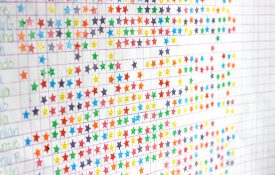-

At What Age Does Hard Work Add a Shine to Lousy Prizes?
Putting in a lot of effort to earn a reward can make unappealing prizes more attractive to kindergartners, but not to preschoolers, according to research published in Psychological Science, a journal of the Association for
-
New Research From Psychological Science
Read about the latest research published in Psychological Science: Turbulent Times, Rocky Relationships: Relational Consequences of Experiencing Physical Instability Amanda L. Forest, David R. Kille, Joanne V. Wood, and Lindsay R. Stehouwer Can physical instability lead to instability in relationships?
-

Having Wealthy Neighbors May Skew Beliefs About Overall Wealth Distribution
Wealthy people may be likely to oppose redistribution of wealth because they have biased information about how wealthy most people actually are, according to new research published in Psychological Science, a journal of the Association
-

Self-Proclaimed Experts More Vulnerable to the Illusion of Knowledge
Research reveals that the more people think they know about a topic in general, the more likely they are to allege knowledge of completely made-up information and false facts.
-
New Research From Clinical Psychological Science
Read about the latest research published in Clinical Psychological Science: Clarifying the Behavioral Economics of Social Anxiety Disorder: Effects of Interpersonal Problems and Symptom Severity on Generosity Thomas L. Rodebaugh, Richard G. Heimberg, Kristin P. Taylor, and Eric J. Lenze Social anxiety disorder (SAD) is associated with lower interpersonal warmth, something previous studies have detected via behavioral economic tasks. In two studies, the researchers attempted to replicate and expand on these findings by having participants with and without an anxiety disorder complete a flexible iterated prisoner's dilemma (FIPD) task.
-
Firearm Shooting Errors Could Be Reduced Through Cognitive Training
Shooting a firearm requires coordinating many actions that depend upon core cognitive abilities, including the critical ability to stop just before pulling the trigger. People who have difficulty inhibiting responses are more likely to shoot unarmed civilians in simulated scenarios, but response inhibition training can help to reduce these shooting errors, according to new research published in Psychological Science, a journal of the Association for Psychological Science.

